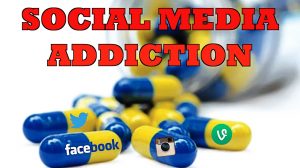
Social Media: Harmless or Dangerous?
The Opinion Pages- Op-Ed Contributor
By: Cassidy Taber June 8, 2017
Many children don’t hesitate to roll their eyes when they hear their parents say “put your phone down!” “Get off of Facebook!” or “You have an addiction to technology!” But is “addiction” to technology, specifically social media, really an overreaching idea? Some people think so. “Adam Singer, the analytics advocate for Google, […] says individuals who abuse something, like social media, to the extent that it causes problems in their lives probably have deeper issues” (Newnam) and that social media is not to blame. While Singer acknowledges that “[a]n addiction will cause the individual to lose out on other things [in] life” (Newnam), he believes that the Internet is so harmless that “a person can spend too much time in social networks but still are able to function adequately in life. Like any activity there is a need to find balance in what we do” (Newnam). There are other experts, however, who think in more grave terms when it comes to the Internet and in fact do believe social media addiction exists.
Unlike other bad habits, such as smoking or alcohol consumption, which need to be totally boycotted “there is no need for you to eliminate the use of social media networks from your life as long as you don’t develop an addiction to it. One of the primary reasons why social platforms such as Facebook, Twitter, and YouTube, etc. are criticized is because they can lead to severe addiction” (Hassan). Social media is an egocentric realm in which users are fueled on likes, comments, and retweets. Internet users may not notice it but the “pleasure centers in your brain are stimulated from social media activity as you get positive reinforcement through the likes and comments on your post. This leads to the production of dopamine that can cause drug-related desires, hence leading to social networking addiction” (Hassan). Internet users tend to get caught up in the game of social networking where they try to get more likes than they did on the last picture they posted, and they will constantly check their phone, pressing the refresh button on their touchscreen every five minutes.
Even though you may not be addicted yet, if you do this you may be showing early warning signs of social networking addiction. The best thing you could do at this point to avoid addiction from setting in may be to take a step back and realize what you may be missing out on while you are networking. Try to tell yourself that it is more worth it to live life than to document it from a computer or phone screen. Parents should be recognizing their child’s change in behavior when Internet addiction sets in. Parents should take action immediately by taking children’s phones away before bed to ensure they are getting proper rest. Parents should also monitor their children’s phone use and take the phone away during family outings so they can properly engage with those around them. These are all simple solutions to help children who may be struggling with staying off of their phones.
So “what’s the big deal?” you may ask? Social media addiction may not seem as drastic as a ‘real’ addiction like to drugs or alcohol, but being hooked to Facebook, Twitter, Tumblr, etc. may lead to other addictions that have far worse affects on your body other than deter your mental state. Out of the “70% of teenagers age 12-17 [who] spend time on a social media site in a typical day […] are five times likelier to use tobacco, three times likelier to use alcohol, and twice as likely to use marijuana” (Stein). Could social media be the 21st century’s new ‘gateway drug’? Experts say that teenagers are more susceptible to substance abuse through social media because of how genetically impressionable they are between age 12 and 17. “Constant exposure to pictures of teens under the influence glamorizes the use of alcohol and drugs” (Stein) and suddenly teenagers are paying a lifelong price battling their multiple addictions because ‘fitting in’ seemed worth it at the time.
Internet use for teens needs to be limited and monitored more closely to spare their young, impressionable minds. I believe that to solve this problem social media sites should put a time limit on the use of their site. When time is up, the app or website will close out and will refresh the next day starting time over for the user. Until a solution is put in place it is ultimately parents and children who are left to the responsibility of teaming up and deciding together: is social media simply just a new medium of communication or is it dangerous after all?
References
Newnam, Jared (February 2, 2011). Does Social Media Addiction Really Exist? Retrieved from https://www.southuniversity.edu/whoweare/newsroom/blog/does-social-media-addiction-really-exist-31795 (accessed June 8, 2017).
Hassan, Wagar (January 8, 2016). How Social Media Addiction is Bad for Mental Health. Retrieved from http://socialnomics.net/2016/01/08/how-social-media-addiction-is-bad-for-mental-health/ (accessed June 8, 2017).
Stein, Emma (April 25, 2014). Social Media Dependency Has Become a Mental Health Issue. Retrieved from http://www.alternet.org/personal-health/social-media-dependency-has-become-mental-health-issue (accessed June 8, 2017).
